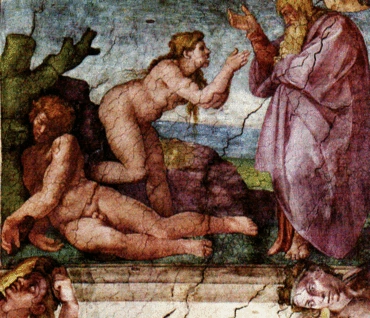Spiegazione di Genesi 2:21
By Brian David (machine translated into Italiano)

Il sonno nella Bibbia rappresenta uno stato di oscurità spirituale, in cui siamo distanti dal Signore e non siamo consapevoli del Suo amore e della Sua saggezza. Il Signore mise il popolo della Chiesa più antica (Adamo) in un tale stato di oscurità (sonno) perché voleva vivere da se stesso. E in un certo senso, l'umanità dorme da allora, ignara che i nostri pensieri, i nostri sentimenti, la nostra stessa vita e il nostro amore fluiscono in noi dal Signore, e non sono nostri.
Ma il Signore permise ad Adamo di continuare. Prese una parte di lui che era meno viva - cioè la meno ricettiva del Signore, poiché il Signore è vita - e si preparò a fare una nuova persona che avrebbe dato ad Adamo la vita che voleva. Il popolo della Chiesa più antica sarebbe stato tagliato fuori dalla comunicazione diretta con il Signore e con il cielo, ma avrebbe invece - attraverso il pezzo di umanità quasi senza vita rappresentato dalla costola - potuto sperimentare la vita come propria.
(References: Arcana Coelestia 147, 148-151)
Arcana Coelestia #1733
1733. 'Possessor of heaven and earth' means the conjunction of the Internal Man, or Jehovah, with the Interior and the Exterior Man. This is clear from the meaning of 'heaven and earth'. That which is interior in man is called 'heaven', and that which is exterior 'earth'. The reason heaven means that which is interior in man is that man as regards interior things is an image of heaven, and so a miniature heaven. The Lord's Interior Man primarily is heaven, for the Lord is the All in all of heaven, and thus heaven itself. The exterior man's being called 'the earth' follows as a consequence of this. Here also is the reason why 'the new heaven and the new earth' described in the Prophets and in the Book of Revelation is used to mean nothing other than the Lord's kingdom and every person who is the Lord's kingdom, that is, who has the Lord's kingdom within him. As regards heaven and earth having these meanings, see 82, 911, for heaven, and 82, 620, 636, 913, for earth.
[2] That 'God Most High, Possessor of heaven and earth' here means the conjunction of the Internal Man with the Interior and Exterior Man in the Lord becomes clear from the consideration that the Lord as regards the Internal Man was Jehovah Himself; and because the Internal Man or Jehovah guided and instructed the External Man - as the Father did the Son - the External Man considered in relation to Jehovah is therefore called the Son of God, but in relation to the mother the Son of Man. The Lord's Internal Man, which is Jehovah Himself, is that which is here called 'God Most High', and until complete conjunction or union had taken place it is called 'Possessor of heaven and earth', that is, Possessor of all that resided in the Interior and Exterior Man, which, as has been stated, is here meant by 'heaven and earth'.






